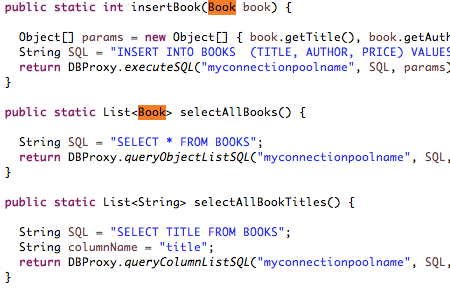
Yank
Ultra-Light JDBC Persistance

Ultra-Light JDBC Persistance Layer
Yank is a very easy-to-use yet flexible SQL-centric persistence layer for JDBC-compatible databases build on top of org.apache.DBUtils. Yank is a different approach to the over-ORMing of Java persistence. Rather than try to abstract away the SQL underneath, Yank assumes you want low level control over the SQL queries you execute. Yank wraps DBUtils, hiding the nitty-gritty Connection and ResultSet handling behind a straight-forward proxy class: Yank. “Query” methods execute SELECT statements and return POJOs or a List of POJOs. “Execute” methods execute INSERT, UPDATE, and DELETE (and other) statements. Recently, annotation-based column-field mapping, batch executing, column list querying and scalar querying has been added. Since version 3.0.0, Yank uses the Hikari connection pool as its integrated connection pool.
Usage is very simple: Simply define jobs, define triggers, and start the yank scheduler.
Features
- Apache 2.0 license
- ~16KB Jar
- Uses Apache DBUtils for JDBC
- Uses HikariCP for connection pooling
- Supports prepared statements
- Java object create, read, update, and delete (or CRUD) operations
- Automatic snake case (my_column_name) to camel case (myColumnName) mapping
- Automatic column name to field mapping via annotations
- Retrieving assigned auto-increment primary key ID for inserts
- Java object and object List querying
- Scalar querying
- Column List querying
- Batch execute
- Works with any JDBC-compliant database
- Write your own SQL statements
- Optionally store connection pool properties in a Properties file
- Optionally store SQL statements in a Properties file
- Multiple connection pools allows for connecting to multiple databases in a single app
- Java 8 and up
What’s Next?
Now go ahead and study some examples, download the thing and provide feedback.
Simplicity
Simplicity prioritized over everything else so you can quickly persist your data and move on.
Cross-technology
Use in your all you Java applications. Use your favorite JDBC-compatible database or even a mixture of different types.
License
Apache 2.0 open source license means you can use it worry-free in your personal and commercial projects.

